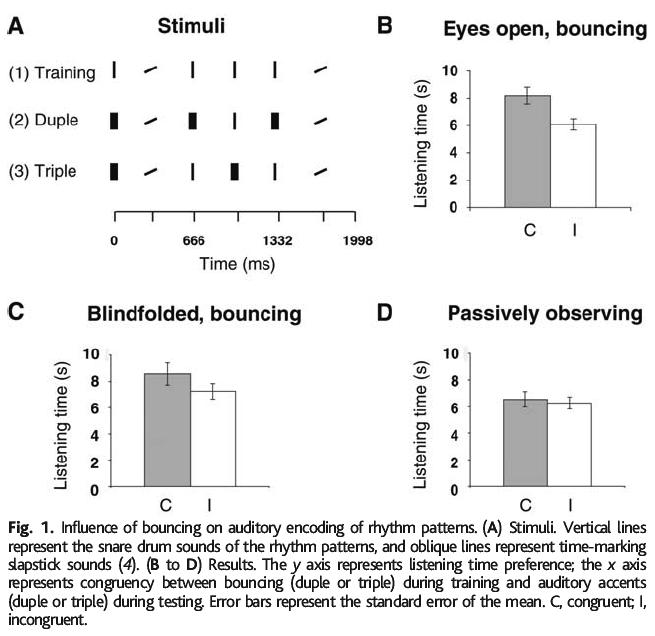
Phillips-Silver, J. and L.J. Trainor. "Feeling the Beat: Movement Influences Infant Rhythm Perception." Science, Vol. 308, 5727, 1430, 3 June 2005.
I do not think this pattern can be heard as either duple or triple, and therefore ambiguous. Rather, this pattern is clearly a duple pattern, given the weak beats on the 2nd and 6th beats. Because beat 2 is much weaker than beat 3, (beat 3 being just as strong as beat 1), beat 3 sounds like a new downbeat. The rest of the pattern confirms this, with beat 5 much stronger than beat 6. This paper by Justin London illustrates my claim, as do the cited articles by Mari Riess Jones. Thus I think there is a bias towards the duple pattern, which could have masked the bouncing effect somewhat. The babies trained in the triple pattern may not have felt as strong an affinity for the congruent condition, weakening the difference between the two conditions.
For fun, the other two beat patterns are found here and here. The addition of dynamic accents do intensify the duple feel in the second pattern, and do make the triple feel possible in the third pattern. But absent of these strong accents, the timbral accents take over to create the unambiguous meter of the training stimulus.
3 comments:
I like JL's paper as well. I didn't look at this particular paper in Science, but it is really irritating that the scientists really don't seem wto understand that they really need to consult with actual musicians about things like this.
Grrrrr.
jwb
I had that frustration on hearing a few of the papers at the Neuroscience and Music conference. There were some psychologists that had just enough music theory knowledge to make themselves dangerous, i.e. not willing to consult with a musician in constructing their stimuli. Others were very good at collaborating with musicians. I need to collaborate with the scientists in my own research, which I'm slowly starting to do.
Yeah, collaboration is always hard. I think it's especially difficult for those of us who have been trained in the humanities, where individualized production of knowledge is valorized. Nevertheless, I've collaborated quite a lot, but with people in the discipline. I do lots of interdisciplinary work and I should really see about setting up a collaboration there. And then there are a number of perception researchers who are interested in my area and I should do a better job of seeking them out for collaboration.
Still, there is no doubt that collaboration can be very frustrating as well as rewarding.
jwb
Post a Comment